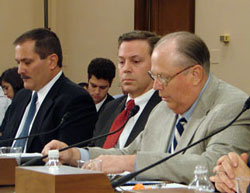 It looks like this whole credit crunch issue is affecting agriculture according to some testimony on Capitol Hill today by the Association of Equipment Manufacturers. You can watch a video of it here.
It looks like this whole credit crunch issue is affecting agriculture according to some testimony on Capitol Hill today by the Association of Equipment Manufacturers. You can watch a video of it here.
The Chair of AEM’s Small Enterprise Committee, Richard A. Brown, testified on Tuesday, October 28, 2008 before the House Committee on Small Business at 10 a.m. EST. Brown is the President and COO of Krause Corporation, based in Hutchinson, Kansas. The hearing is on “Creating Opportunities for Small Businesses in an Economic Recovery.”
In his prepared statement, Brown expressed his concerns to the committee for small businesses in the U.S. obtaining credit during the present economic crisis. As an example, Brown cited one business person from rural South Carolina who “had an operating line of credit with (a bank) that was secured by a stock portfolio, but with the unraveling of the market their line was frozen … Now (he) is spending most of his time trying to resolve the issue when he should be working to secure orders in this down market.”
Brown pointed out that the crisis is also now hitting agriculture. “The economic foundation for countless small businesses on thousands of Main Streets throughout the country is agriculture,” he said. “The tightening of the credit markets is coinciding with a rapid rise in the cost of agricultural inputs, such as fertilizer, seed, chemicals and fuel.”
Here’s another excerpt from his testimony:
“We are now seeing farmers delay the purchase of these inputs from their “normal” pre-season purchasing patterns as they are having trouble accessing credit and are hesitant to pay such steep prices. The ripple effects of tightening credit markets at a time of increasing capital requirements for agriculture will lead to economic hardships for rural America. I can also say that I personally perceive a sense of anger among rural Americans about this situation. Generally speaking, they did not buy homes they could not afford or run up huge credit card debt, but now are forced to deal with the consequences of other people’s excesses and as a consequence are losing faith in the system.”
